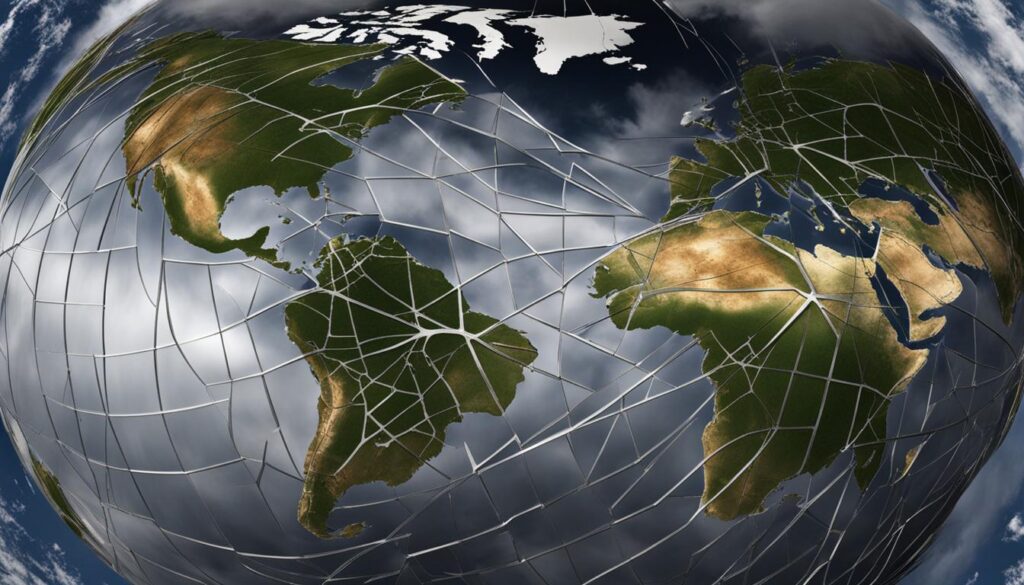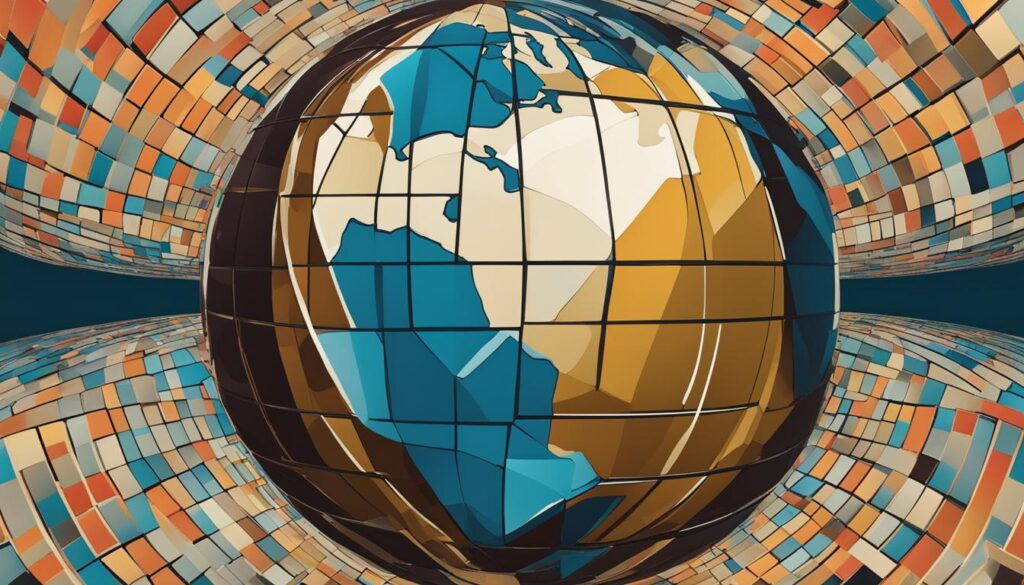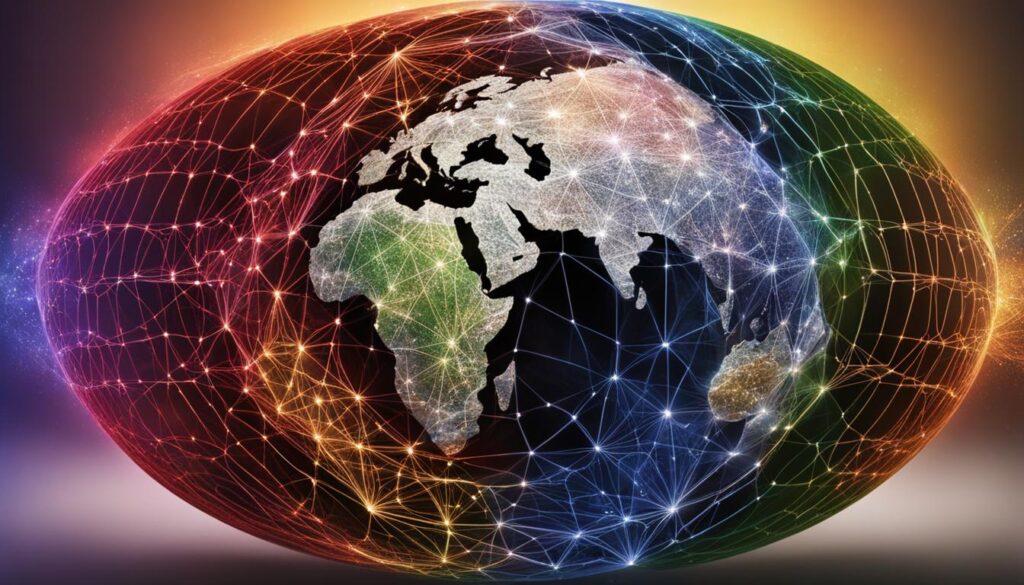Welcome to our article exploring the fascinating and ever-evolving world of global affairs. In today’s interconnected global landscape, it is essential to comprehend the intricate dynamics that shape our world. From global politics and international relations to world events and global governance, this article will provide valuable insights into the forces at play.
As we navigate the complexities of the post-Cold War global order, it becomes evident that significant challenges await us. Russia’s invasion of Ukraine and China’s construction of artificial islands in the South China Sea have raised concerns about the preservation of global norms. Moreover, globalization and climate change have created a pressing need for global responses.
It’s not only traditional factors that impact global affairs but also the role of new technologies. Automated trading algorithms and military robotics bring both opportunities and challenges, with implications for global governance and norms. Understanding these drivers of change is crucial to preserving and evolving the international order.
Through extensive research and analysis, our experts have sought to understand the dynamics of global affairs and offer ideas for the future of the international order. Join us as we delve into the intricacies of global politics, international relations, and the ever-changing world events that shape our globalized society.
Key Takeaways:
- Global affairs are constantly evolving, influenced by factors such as global politics, international relations, and world events.
- The post-Cold War global order is at a tipping point, with challenges posed by Russia’s invasion of Ukraine and China’s actions in the South China Sea.
- New technologies like automated trading algorithms and military robotics present both opportunities and challenges for global norms.
- Globalization and climate change require global responses for effective governance.
- Understanding the drivers of change is crucial to preserving and evolving the international order in a rapidly changing world.
The Fracturing World and the Future of Globalization
The world has become increasingly interconnected over the past century, but recent trends indicate a fracture in the established world order. Populism, nationalism, and the COVID-19 pandemic have challenged international cooperation. The resilience and future of globalization are being questioned, especially with the fragility of lengthy supply chains and the potential for technology to divide rather than unite us. The colloquium report on the future of globalization explores these issues and offers insights into building a more resilient and equitable global economic order.
As we navigate the complexities of a fracturing world, it is crucial to assess the future of globalization and its impact on various global issues. The report highlights how globalization has not only facilitated economic growth and increased interconnectedness but has also exposed vulnerabilities within the international system. The COVID-19 pandemic, for instance, showcased the limitations of global coordination in responding to a public health crisis.
“The COVID-19 pandemic has underlined the need for a more coordinated and cooperative approach to global challenges,” said Dr. Jane Marshall, a renowned expert in international relations. “We cannot afford to ignore the fractures in our global order. Instead, we must actively work towards building a more inclusive and resilient system that can address pressing global issues while ensuring no one is left behind.”
The report suggests that addressing the fractures in the world order requires a multifaceted approach. It emphasizes the importance of strengthening international cooperation to tackle global challenges such as climate change, economic inequality, and cybersecurity threats. Additionally, the report highlights the need for more inclusive decision-making processes that consider the perspectives and interests of emerging economies and marginalized communities.
| Insight | Description |
|---|---|
| 1. Changing Paradigms | The traditional model of globalization based on liberal market principles is evolving, necessitating a reevaluation of global economic structures and policies. |
| 2. Reshaping Power Dynamics | The rise of emerging economies is shifting the balance of power, challenging the dominance of traditional powers and calling for a more inclusive global governance system. |
| 3. Technological Divides | The digital divide and the potential for technology to exacerbate inequalities highlight the need for comprehensive policies that ensure equitable access and responsible use of technology. |
| 4. Strengthening Multilateralism | Efforts to address global challenges must be underpinned by strong multilateral institutions that promote cooperation, dialogue, and collective action. |
Understanding the future of globalization and its implications for global affairs is essential for navigating the evolving landscape. By acknowledging the fractures in our world order and actively working towards more inclusive and resilient systems, we can forge a path towards a more cooperative and sustainable future.

The Unipolar Movement and Global Power Balance
As the post-Cold War era unfolds, experts are reevaluating the notion of a unipolar world where power is primarily concentrated in a single country. Instead, emerging trends suggest a more distributed power structure, as various nations gain influence and reshape the international system. This shift has significant implications for the global power balance and the dynamics of international relations.
Ambassador Jorge Heine, a specialist in International Relations, argues that power is no longer uniform but varies across different aspects. Economic power, military capabilities, technological advancements, and soft power all factor into the complex interplay of global influence. With emerging countries like China and India asserting themselves on the global stage, traditional power dynamics are being challenged and reconfigured.
“The era of one dominant power is behind us. We are witnessing a new reality where influence is diffused, and multiple actors shape global affairs.”
This evolving landscape of global power presents both opportunities and challenges. It creates space for emerging countries to assert their interests and contribute to global decision-making. However, it also raises questions about the stability of the international system and the potential for heightened conflicts. The distribution of power across multiple nations necessitates careful diplomacy, cooperative frameworks, and a reevaluation of existing institutions to ensure effective global governance.
Implications for the International System
With the decline of a unipolar world, the international system is undergoing a profound transformation. Traditional power structures centered around a single dominant state are giving way to a more multipolar arrangement. This shift requires the development of new norms, institutions, and strategies to manage global challenges and conflicts.
| Aspect | Implication |
|---|---|
| Economic Power | The rise of emerging economies as major players in global trade and investment necessitates the recalibration of economic policies and cooperation to address issues like fair trade, investment flows, and economic development. |
| Military Capabilities | The growing military capabilities of emerging countries demand a reevaluation of defense alliances, arms control agreements, and strategic partnerships to maintain regional and global stability. |
| Technological Advancements | The diffusion of technological innovation across multiple nations requires collaboration on emerging issues like cybersecurity, data privacy, and the ethical use of emerging technologies. |
| Soft Power | The influence of nations in shaping public opinion, cultural exchange, and global narratives becomes increasingly important in a more multipolar world, necessitating strategic efforts to enhance soft power capabilities. |
As the global power balance continues to evolve, policymakers and world leaders must navigate these complex dynamics to ensure a peaceful and prosperous future. By embracing diversity and fostering international cooperation, nations can collectively address global challenges and build a more inclusive and resilient international order.

Emerging Dynamics in Global Affairs
The next two decades will witness significant changes and emerging dynamics in the global affairs landscape. As advancements in technology continue to shape the world, the global environment is becoming more complex and interconnected. This evolving geopolitical landscape will have profound implications for interstate conflict and the future of international cooperation.
The rivalry between the United States and China will play a crucial role in shaping global dynamics. These two nations, with their competing interests and ideologies, will exert the greatest influence on the international stage. Their actions and strategies will strain existing alliances, international organizations, and the norms that underpin the current international order.
In this highly competitive environment, interstate conflict is likely to rise. Technological advances will enable a greater variety of actors to exert influence, leading to confrontations over resources, territory, and economic dominance. The complexity of this landscape challenges the traditional tenets of multilateralism and calls for new cooperative arrangements.
Emerging Dynamics in Global Affairs
“The rise of emerging powers and the increasing role of technology are reshaping the global power balance and creating new dynamics in international relations.” – Ambassador Jorge Heine
These emerging dynamics necessitate careful analysis and strategic thinking. It is crucial for policymakers and international stakeholders to adapt and respond effectively to this rapidly changing global environment. By understanding the geopolitical landscape and its emerging dynamics, we can foster greater stability and cooperation in the years to come.
| Emerging Dynamics | Impact |
|---|---|
| Technological advancements | Enable a greater variety of actors to exert influence and potentially escalate interstate conflicts. |
| Rivalry between the United States and China | Strain existing alliances and international organizations, challenging the norms that underpin the international order. |
| Complexity of the geopolitical landscape | Calls for new cooperative arrangements and reevaluation of traditional multilateral approaches. |
The emerging dynamics in global affairs require a proactive and forward-thinking approach from all stakeholders. By recognizing these challenges and opportunities, we can work towards a more stable, cooperative, and prosperous global environment.

Conclusion
As we navigate the dynamics of global affairs, it becomes evident that the future of the global order is uncertain. The challenges posed by globalization, technology, and power shifts call for enhanced international cooperation. Understanding the drivers of change and the implications of these changes is crucial. The research, discussions, and insights provided by various sources shed light on the complexity of global affairs and emphasize the need for innovative ideas in preserving and evolving the international order.
By staying informed and actively engaging in the dialogue, you can contribute to shaping a more stable and cooperative global environment. The future of global order depends on the collective efforts of individuals, organizations, and nations working together. It is through international cooperation that we can address the pressing global issues and forge a path towards a more inclusive and sustainable future.
As you reflect on the intricacies of global affairs, keep in mind the importance of collaboration and open dialogue. The complexities of the world require diverse perspectives and collective action. By fostering meaningful partnerships and embracing mutual understanding, we can pave the way for a future where global cooperation prevails and the challenges we face are met with resilience and unity.
FAQ Dynamics of Global Affairs
What are the drivers of change in global affairs?
The drivers of change in global affairs include globalization, technology advancements, power shifts, and emerging dynamics.
What challenges are posed by globalization?
Globalization poses challenges such as fragility of lengthy supply chains, potential technology division, and the resilience and future of globalization being questioned.
How has the global power balance shifted?
The global power balance has shifted from a unipolar movement to a more distributed power structure as emerging countries gain influence and reconfigure the international system.
What are the implications of emerging dynamics in global affairs?
Emerging dynamics in global affairs, driven by technological advancements and a greater variety of actors, are likely to lead to a rise in interstate conflict and challenge multilateralism.
How can international cooperation address the challenges in global affairs?
International cooperation is crucial in addressing the challenges posed by globalization, technology, and power shifts. Understanding the drivers of change and actively engaging in dialogue can contribute to shaping a more stable and cooperative global environment.

